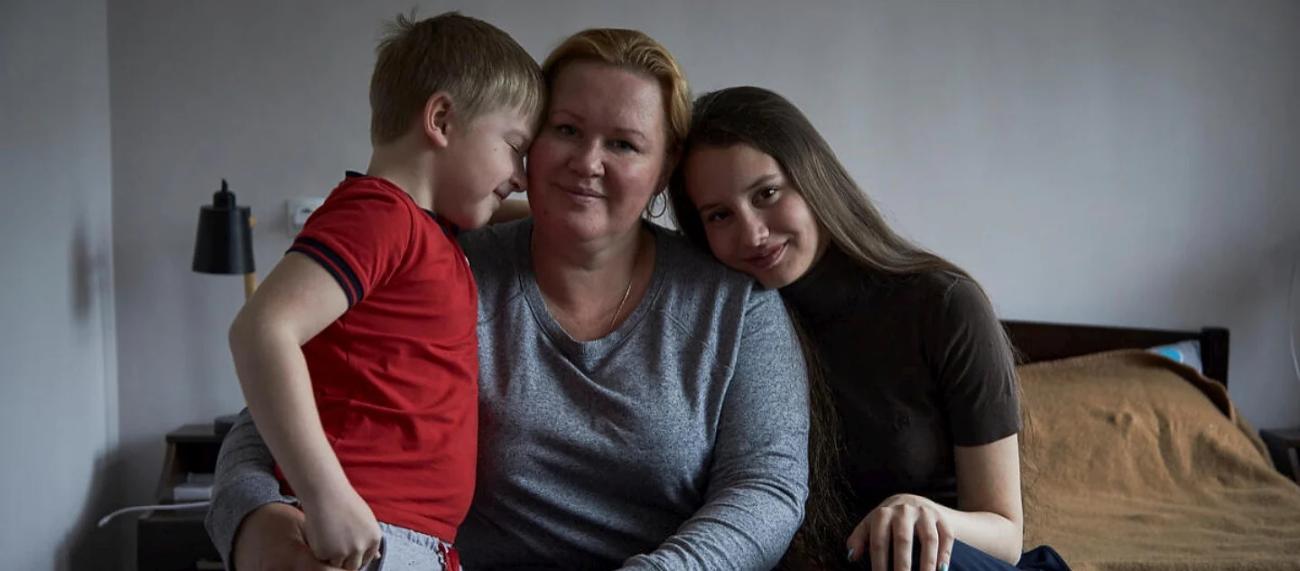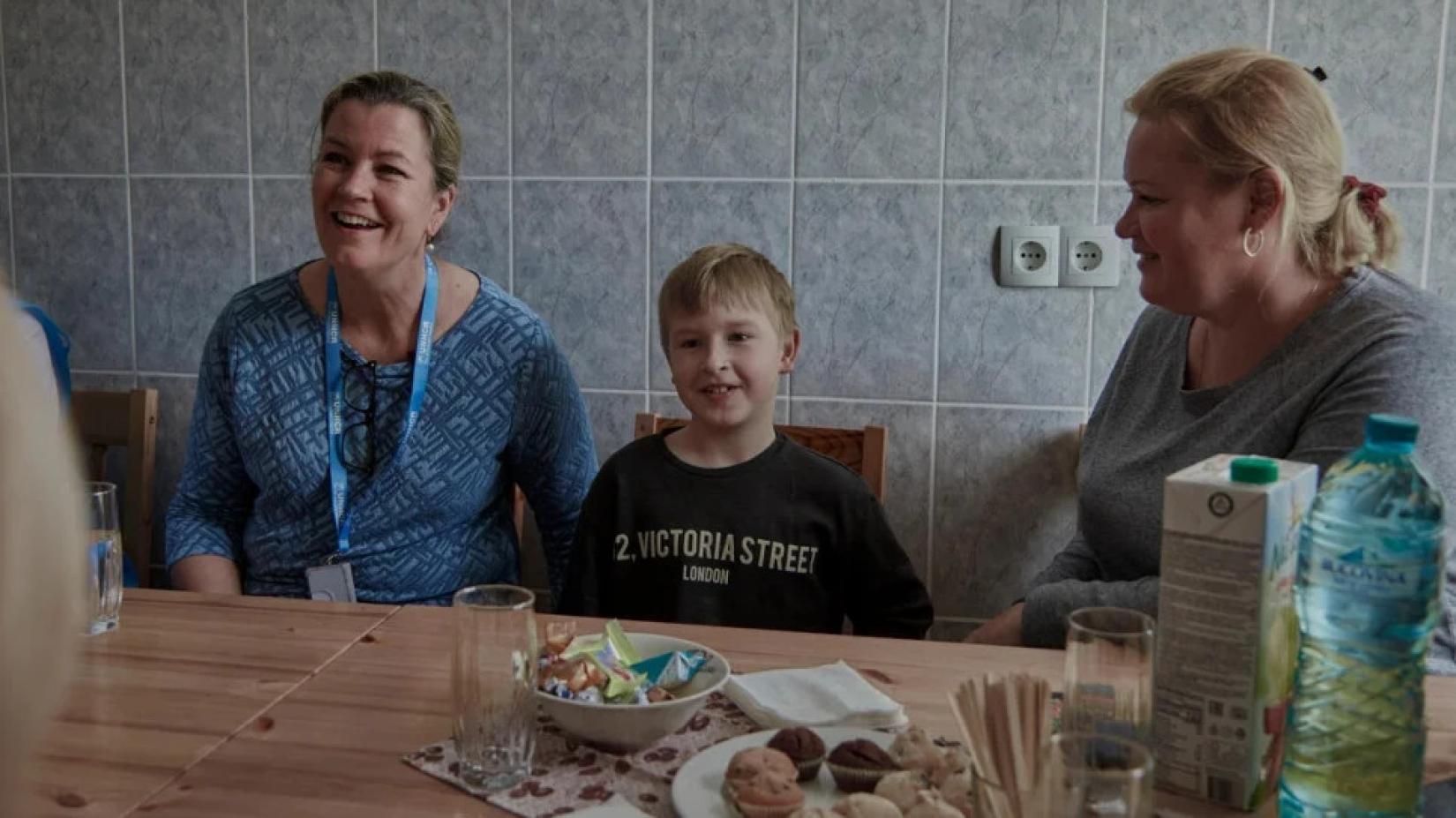Ukrainian refugees find warm welcome in neighbouring Moldova

While many move on, Olga and her children are among 100,000 Ukrainians staying in Moldova.
Olga and her husband had almost finished construction on a new house for them and their two children when the bombs began raining down in early March. Their village in Ukraine’s Odesa region was near two military bases targeted by missiles, but with no basement in their new home, they were forced to take cover as best they could.
“We hid in the inner rooms of the house on the floor. I covered the children with mattresses and pillows. It was so stressful,” Olga, a 42-year-old teacher and accountant, explains. “We couldn’t stand it anymore, so we decided to leave.”
Olga, her sister, and their children and in-laws – four adults and four kids in total – crammed into her small family car with warm clothes and a few belongings and headed for the Moldovan border. With thousands on the roads trying to flee at the same time, the 60-kilometre journey took more than 24 hours.
After a sleepless night parked in a field during the nighttime curfew, they finally drove across the border and headed for the Moldovan capital, Chisinau.
“We couldn’t stand it anymore.”
“When we first came here, we didn’t know what to do, or where to rest, or where to eat. That was the toughest moment for us,” Olga remembers. “We were unwashed, we hadn’t eaten, we had small kids with us who were crying the whole trip.”
More than 460,000 refugees from Ukraine – mostly women, children and older people – have crossed into Moldova since the start of the conflict in late February. While many have moved on to Romania and other EU countries, Olga and her children are among nearly 100,000 who have chosen to stay in Ukraine’s smallest neighbour.

Despite the challenges for a small country with a population of around 2.7 million and limited resources, Moldova and its people have opened their doors to the refugees. Ukrainians have the right to live and work in the country and access services such as health care and education, while some 95 per cent of the arrivals are being hosted by Moldovan families.
Olga experienced this welcoming spirit herself, shortly after arriving in the capital.
“Local people came up and helped me – people I didn’t know who were just passing by. I was so grateful,” she says. A helpful Chisinau resident rang round and found a temporary shelter where they could finally rest. “I must have slept for 24 hours,” Olga adds.
While her sister and in-laws travelled on to Poland to stay with relatives, Olga wanted to stay as close as possible to Odesa and her husband who – like most Ukrainian men aged 18-60 – had to stay in the country.
Now, she and her daughter Daria, 15, and son Sergey, 7, have found free long-term accommodation along with 80 other Ukrainians at a university dorm in the city, which is one of 92 refugee accommodation centres set up by the authorities around the country to house refugees.
Their small apartment is neat and bright, with polished parquet floors and some of Olga’s oil paintings – a favourite pastime – hanging on the walls. In the bedroom is a large double bed where they all sleep, and a small desk where the children join online lessons with their teachers and classmates from Ukraine – most of whom have also fled.
During a recent visit to Moldova, Kelly T Clements – Deputy High Commissioner for UNHCR, the UN Refugee Agency – visited the dorm to meet families living there and expressed gratitude for the welcome refugees had received in the country.
“I’ve been truly, truly overwhelmed by the generosity, the solidarity, the support that the Moldovan people have provided the people of Ukraine,” Clements said.
Olga and other residents described the situations they had fled, as well as their hopes for the future.
“All of them wanted to go back as soon as they could, … as soon as it’s safe. They’ve left husbands and brothers and uncles and sons, and they want nothing more than to be able to go home to a Ukraine that is peaceful,” Clements said.
UNHCR has added almost 100 staff to its team in Moldova since the start of the crisis to help refugees and support the work of the authorities. Together with its partners, the agency is present at the border and in locations around the country, providing material assistance, information, and services including legal and psychological support, transport to EU countries, child protection services and measures to address gender-based violence and trafficking risks.
A key element in the agency’s response is its cash assistance programme, through which refugees receive around 2,200 Moldovan Lei (US$120) per month after signing up at one of eight enrolment centres or with mobile enrolment teams that travel to remote areas. More than 50,000 refugees in Moldova have already received cash on bank cards, with thousands more currently being enrolled to receive payments.
“It’s more convenient to have this assistance in cash, because I can spend the money on what I really need,” Olga explained. “When we came here, we were still wearing winter clothes … because a month ago it was still cold. Now we want to put on summer [things] because it’s already very hot during the day.”
Olga hopes to find part-time work – perhaps as a private tutor – to help support her family and save some money for when they can return to Ukraine – something she longs for, without knowing when it will be possible.
“Spring has already passed while we’ve been here. I want to return as soon as possible, because there are a lot of things to do there. We need to work and to study,” she says. “[But] for now I feel more comfortable here with my kids.”



